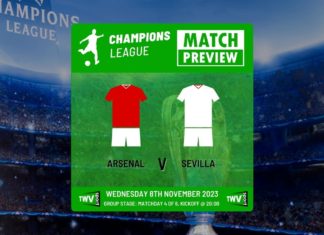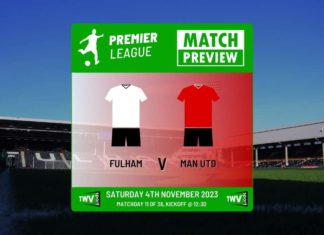Manchester United began life in 1868 as Newton Heath, a works team for the local Lancashire and Yorkshire Railway. After initially playing against teams from other local companies, they played their first competitive match against Bolton Wanderers Reserves in 1880, wearing the green and gold livery of the railway. Newton Heath played in various local leagues which were absorbed eventually into the Football League, where the club found itself in the Second Division.
In 1902 the club was on the verge of bankruptcy when a group of businessman clubbed together to save it, changing the name to Manchester United. The club also changed its colours to those with which it is associated today – red shirts, white shorts, and black socks. Four years later the club were promoted back to the First Division, winning their first league title in 1908. The FA Cup arrived in 1909, and a second league title two years later.
The inter-war years were a fallow period for United. Relegated in 1922, they then spent the next decade alternating between the two top tiers of the league, and almost went bankrupt again in 1931.
Immediately after the Second World War, Matt Busby was appointed manager, and he transformed the club, after being given unprecedented control over training, transfers, and the selection of the team. For three years in a row the club finished second in the table, and they won the FA Cup again in 1948.
In 1952 the club won its second league title, and added two more in 1956, and 1957 with a team composed of mainly exciting young players, most of whom had come through the youth system at Old Trafford, known affectionately as “The Busby Babes”. The club became the first English club to compete in the European Cup. Unfortunately, their European adventures would, inadvertently, destroy the team.
In February 1958, flying home from a European Cup tie in Belgrade, the plane carrying the United team crashed in heavy fog at Munich. 23 people died, including 8 players, and Busby was so badly injured he was administered the last rites twice, although he eventually survived.
By the early 1960s Busby had rebuilt the team around Munich survivor Bobby Charlton, the next generation of youth players like George Best and acute signings like Denis Law. They won the title again in 1965 and 1967, and in 1968 became the first English club to win the European Cup.
The post-Busby years were difficult for the club, and they suffered the embarrassment of being relegated in 1974, but only spent one season in the Second Division before bouncing straight back as champions. They reached three FA Cup Finals in four years, beating Liverpool in 1977, but losing to Southampton and Arsenal in 1976 and 1979.
In the early part of the following decade, they won the FA Cup twice more, but in 1986, with the club in relegation danger, manager Ron Atkinson was dismissed, and Alex Ferguson, who had enjoyed a highly successful spell with Scottish club Aberdeen – winning 3 league titles, four Scottish Cups, a League Cup and the European Cup Winners’ Cup – was appointed in his place.
Ferguson, despite taking United to a second place finish in his second season at the club, initially struggled to make much of an impression at Old Trafford, and was famously within one result of getting the sack in 1990 when his side were drawn away to Norwich City in the FA Cup. A narrow win relieved the pressure, and the side went all the way to the final, which they eventually won, beating Crystal Palace after a replay. That brought Ferguson his first trophy as United manager, and ushered in a period of two decades, during which United established themselves as the most successful English club side ever, whilst Ferguson (who later became Sir Alex) became the most successful club manager in his own right.
Two years later, Ferguson won his first European trophy, the European Cup Winners Cup, beating Barcelona in the final, and then he secured his first league title in 1993, with United finishing the season 10 points clear of their nearest rivals, Aston Villa. Twelve more league titles would follow in the succeeding years.
In 1999 United won a historic treble of trophies – the league and cup double, followed by the Champions League, secured when the team came from behind to score two goals in injury time to beat Bayern Munich. Ferguson would win the European Cup again, beating Chelsea on penalties in 2008. They also lost in the final to Barcelona in 2009 and 2011.
The Ferguson era also saw United win a host of other trophies, including four more FA Cups, four League Cups, the European Super Cup, and the Club World Cup in 2008.
Ferguson was manager at Manchester United for 26 years, until he stepped down at the end of the 2012 – 2013 season. Since then, the club have struggled to replicate the success that they had under the Scot.
David Moyes, the former Everton manager was brought into succeed him, but he lasted less than a season before he was sacked after the club failed to defend their league title and missed out on Champions League qualification for the first time since 1996. The experienced Dutch coach Louis van Gaal then was appointed in his place, but, after winning the FA Cup at the end of his second season, he was fired a few days later.
Amidst much fanfare former Chelsea, Porto and Real Madrid manager Jose Mourinho was made manager in 2016, but, despite winning the League Cup and UEFA Cup in his first season at the club, and steering the side to a second place finish in the Premier League, he too was fired in December 2018, with the club in a poor run of form and amidst reports that he had lost the dressing room.
Former player Norwegian Ole Gunnar Solskjaer was brought in as interim coach, before being confirmed on a permanent basis in March 2019. Solskjaer has failed to arrest the decline so far. United finished sixth at the end of his first season in charge, and made their worst start to a season in 30 years in the 2019 – 2020 campaign.
Despite this, Manchester United remains one of the most widely supported clubs in the world, with millions of fans at home and abroad. They are also a global brand, and one of the world’s highest earning clubs.
United have close rivalries with Manchester City, Liverpool, Arsenal and Leeds United for a variety of historical and geographic reasons.








